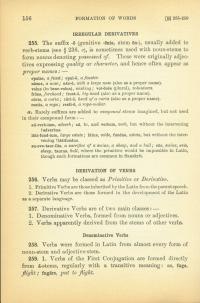255. The suffix -ō (genitive -ōnis, stem ōn-), usually added to verb stems (see § 236.c), is sometimes used with noun stems to form nouns denoting possessed of. These were originally adjectives expressing quality or character, and hence often appear as proper names.
epulae a feast
epul-ō a feaster
nāsus a nose
nās-ō with a large nose (also as a proper name)
volus (in bene-volus) wishing
vol-ōnēs (plural) volunteers
frōns forehead
front-ō big-head (also as a proper name)
cūria a curia
cūri-ō head of a curia (also as a proper name)
restis a rope
resti-ō a rope-maker
a. Rarely suffixes are added to compound stems imagined, but not used in their compound form.
ad-verb-ium adverb
ad (to) and verbum (verb)
[no intervening †adverbus]
lāti-fund-ium large estate
lātus (wide) and fundus (estate)
[no intervening †lātifundus]
su-ove-taur-īlia a sacrifice of a swine, a sheep, and a bull
sūs (swine), ovis (sheep), and taurus (bull)
[The primitive would be impossible in Latin, though such formations are common in Sanskrit.]

